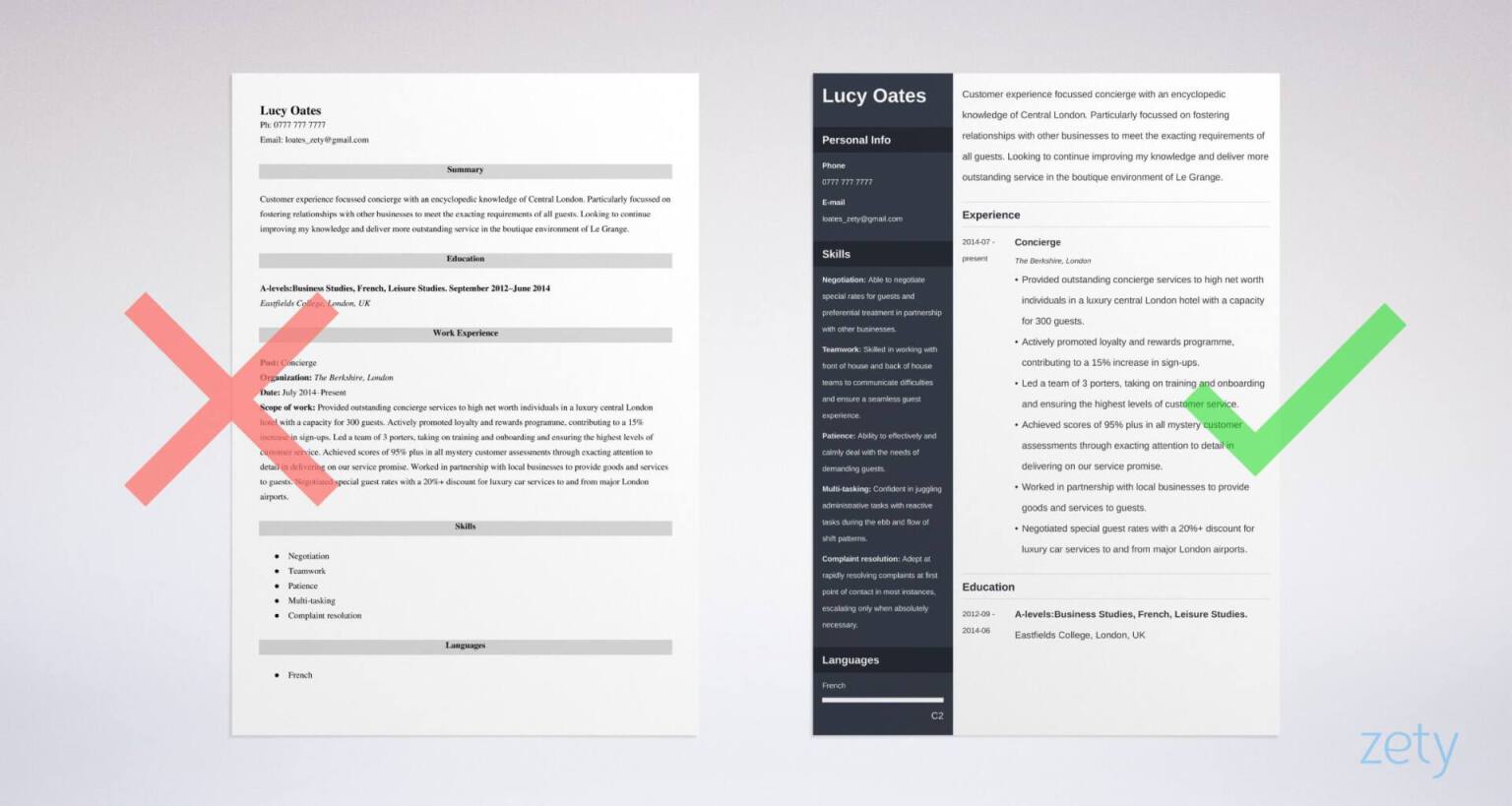Hospitality CV Examples, Template, & Skills for a CV
Create your CV nowThere’s one thing every hospitality worker needs to maximise their career potential. A well-written hospitality CV. You’ve come to just the right place to learn how to create one yourself.
This guide will show you:
- Hospitality CV examples that will inspire you.
- An easy step-by-step guide to writing a CV for hospitality jobs.
- How to format your hospitality CV template the right way.
- How to pick the right hospitality skills for CVs.
Want to save time and have your CV ready in 5 minutes? Try our CV builder. It’s fast and easy to use. Plus, you’ll get ready-made content to add with one click. See 20+ CV templates and create your CV here.
Hospitality CV made with our builder—See more CV examples here.
And we’ve also got CV writing guides for specific hospitality jobs and more.
- Bartender CV Example & Writing Guide
- Chef CV Example & Writing Guide
- Waiter / Waitress CV Example & Writing Guide
- Customer Service CV Example & Writing Guide
- Barista CV Example & Writing Guide
- Care Assistant CV & Writing Guide
- Architecture CV Example & Writing Guide
- Business Analyst CV Example & Writing Guide
- Warehouse Operative CV Example & Writing Guide
- CV for Work Experience Example & Writing Guide
What is a hospitality CV?
A hospitality CV is a job application document that targets jobs in the hospitality sector. It details your relevant experience and qualifications to help you get the job you want. A good hospitality CV puts emphasis on hospitality skills such as multitasking and teamwork.
See a professional CV example for hospitality jobs below:
Hospitality CV example
Lucy Oates
Ph: 0777 777 7777
Email: loates_zety@gmail.com
Customer experience focussed concierge with an encyclopedic knowledge of Central London. Particularly focussed on fostering relationships with other businesses to meet the exacting requirements of all guests. Looking to continue improving my knowledge and deliver more outstanding service in the boutique environment of Le Grange.
Work Experience
Concierge
The Berkshire, London
July 2014–Present
- Provided outstanding concierge services to high net worth individuals in a luxury central London hotel with a capacity for 300 guests.
- Actively promoted loyalty and rewards programme, contributing to a 15% increase in sign-ups.
- Led a team of 3 porters, taking on training and onboarding and ensuring the highest levels of customer service.
- Achieved scores of 95% plus in all mystery customer assessments through exacting attention to detail in delivering on our service promise.
- Worked in partnership with local businesses to provide goods and services to guests.
- Negotiated special guest rates with a 20%+ discount for luxury car services to and from major London airports.
Education
A-levels:Business Studies, French, Leisure Studies. September 2012–June 2014
Eastfields College, London, UK
Skills
- Negotiation: Able to negotiate special rates for guests and preferential treatment in partnership with other businesses.
- Teamwork: Skilled in working with front of house and back of house teams to communicate difficulties and ensure a seamless guest experience.
- Patience: Ability to effectively and calmly deal with the needs of demanding guests.
- Multi-tasking: Confident in juggling administrative tasks with reactive tasks during the ebb and flow of shift patterns.
- Complaint resolution: Adept at rapidly resolving complaints at first point of contact in most instances, escalating only when absolutely necessary.
Languages
- French—C2
And now that you’ve seen a perfectly written hospitality CV example it’s time to learn how to write your own.
How to write a hospitality CV?
1. Use the best format for your hospitality CV template
Being a hospitality worker is centred around the provision of leisure and entertainment to customers. A wide range of roles are involved in operating and supporting the industry. These range from hotel managers to chefs to bouncers and many more.
So your hospitality CV needs to show you have the skills and experience to excel in your particular role and contribute to your corner of the industry.
Here’s how to set up your hospitality CV template:
- Choose chronological CV format for your hospitality CV. It’s the traditional format that most hiring managers are comfortable with and it lets your work experience take centre stage.
- Get your layout sorted. Start with the best font for a CV. Design experts say Arial and Verdana are particularly pleasing to the eye, but a classic serif font like Times New Roman is also spot on.
- Create a good CV structure by setting your page margins to one inch and ensuring you double space between CV sections. That way you’ll create plenty of white space to frame your content and make it easy on the eye.
- Save your hospitality CV as a PDF to keep that formatting as crisp as a newly changed set of hotel sheets.
- Plan for a good CV length, 1–2 pages is best.
- Don’t include unnecessary personal details such as your photo, marital status or date of birth.
Read more: How to Create A Perfect CV Layout
2. Create a hospitality CV personal profile
Your CV personal profile or personal statement is the very first section of your CV. Also known as a CV summary, it acts as the introduction to everything that follows. So in just 3–4 lines you need to give a flavour of what you can offer as a candidate and show the hiring manager that your hospitality CV is worth reading.
All you need to do to give them a taste of what’s to come is to answer three very simple questions:
- Who are you?
- What can you offer to the employer?
- What are your career goals?
But the way you answer them depends on your level of experience. If you’ve been in the trade for some time, and you’re writing a hospitality manager CV for example, use this approach.
- Make a list of all of your professional experience and abilities. Everything that helps you to succeed in your particular hospitality role.
- Then take a look at the job advert and see what experience and abilities it mentions as requirements. Choose 3–4 points from your own list that match up with the requirements and use those to write your personal profile.
If you haven’t got much direct hospitality experience then use this simple variation on that strategy.
- Again, list all of your experience and abilities. Consider previous jobs even if they’re not hospitality related and any education or training you’ve undertaken. Then highlight everything that’s transferable to the role you’re applying for.
- Write your personal statement by combining transferable skills from your own list with passion and enthusiasm for the job to create your CV summary.
And in both cases, leave this section of your hospitality CV until last because you’ll find it easier to write with your work experience and education written out and ready to prompt you.
Read more: 10+ CV Summary Examples
3. Write your hospitality CV work experience section
It’s the most important section of your hospitality CV. This is the part where you prove you’ve learned the ropes and ready to make a contribution to your new employer.
Here's how to fill the work experience section on a CV for hospitality jobs:
- Enter your work history in reverse-chronological order, starting with your most recent job.
- Include the same basic information for each role, your job title, the name of your employer and your dates of employment. Use ‘present’ as the end date if you currently work there.
- Write up to six bullet points for each entry that describes the job. You should start each one with a CV action word to give it more impact. So out with ‘responsible for’ and in with words like achieved, handled and prepared.
- Don’t say what you did, prove how well you did it. You can do that by adding numbers to your achievements and using accomplishment statements.
- Remember to match up your own experience to the job requirements as closely as possible so you create a well-tailored CV.
Read more: How to Write Your Work Experience CV Section
4. Include an education section in your hospitality CV
Lots of candidates treat this section as an afterthought, but every CV needs an education section, and it needs to be structured properly. Here’s how.
- School-leavers should list their A-levels and mention each subject they studied. And if you’ve just left school you can also mention your GCSEs. Don’t list every subject, just mention the number of subjects you did. But do mention Maths and English specifically as they’re a minimum requirement for lots of entry-level roles.
- In both cases, include the name of your school or college and the dates you attended.
- For uni graduates, write the name of your university, the name of your degree and your dates of study. Include your expected graduation date if you’re still studying.
- And if you haven’t yet graduated, or only graduated within the last year, you can change the order of your hospitality CV and put your education section before your work experience.
Read more: How to Write Your CV Education Section
5. Pick the right hospitality skills for a CV
As I mentioned earlier, hospitality isn’t just a single job. It covers a whole range of professions that support an entire industry. But regardless of what your particular job title is it’s important to include a skills section on your CV.
The really challenging part is that you’re limited to a one or two page CV and it’s hard to decide what hospitality skills you should focus on. But there is a way to narrow it down. Here’s how.
- Read the job advert again. It’s the ultimate shortcut to writing a good CV for hospitality because it’s a wish list of what the hiring manager needs. So take a look and make a note of all the skills that are mentioned.
- Then make a second list of all of your own skills. Use the sections of your CV that you’ve already written to help prompt you. When you’re done, compare the two lists and choose 5–10 of your own skills that match those in the job description to include on your CV.
- Include a good mix of soft skills and hard skills to show the full breadth of your abilities.
- And for each hospitality skill you list, back it up with a short sentence that shows how you demonstrate it. E.g. Teamwork: Skilled in working with front of house and back of house teams to communicate difficulties and ensure a seamless guest experience.
Here are some examples of skills that would look great on your hospitality CV, but remember to tailor your own list to your specific job role.
Best hospitality skills for CVs
- Customer service
- Teamwork
- Time management
- Multitasking
- Attention to detail
- Interpersonal skills
- Problem-solving
- Hygiene and health and safety
- Flexibility
- Conflict resolution
Read More: How to Write Your CV Skills Section [Best Job-Winning Examples]
When making a CV in our builder, drag & drop bullet points, skills, and auto-fill the boring stuff. Spell check? Check. Start building your CV here.
When you’re done, Zety’s CV builder will score your CV and tell you exactly how to make it better.
6. Put additional sections in your hospitality CV
Think about how busy the average hiring manager is in the hospitality industry. They’ve barely got time for a quick coffee break let alone having to scan through a pile of CVs. And this means that if your hospitality CV is just average they’ll pass over it in a flash. Luckily there’s an easy way to make it stand out, and that’s by adding extra sections. Here are some suggestions.
- If you speak a foreign language then you absolutely must add a languages section. It’s a huge advantage in customer-facing roles in particular.
- Other ideas include volunteering, awards, certificates or hobbies and interests. If it’s relevant and will make you look like a stronger candidate then you should include it.
Read more: CV Hobbies and Interests: Best List of Examples
7. Be sure to add a cover letter to your hospitality CV
Don’t let anyone tell you that the humble cover letter is dead. It’s still an essential part of your job hunt because it helps you flesh out your CV and highlight even more of your expertise and achievements. Whatever hospitality job you’re targetting, a hospitality cover letter will help.
Here’s what to include in a cover letter for hospitality jobs:
- Use the right cover letter format and address your cover letter correctly.
- Plan for the best cover letter length, never more than one page.
- Put a nice ‘hook’ in your cover letter opening by mentioning an impressive professional accomplishment to impress the hiring manager.
- In the middle of your cover letter, add in more proof of your professional achievements and experience and show passion for the job and the employer.
- Add a call to action to your cover letter ending, ask the hiring manager to reach out to you so you can discuss the job in more detail.
- And use matching CV and cover letter templates for a super professional look.
Plus, a great cover letter that matches your CV will give you an advantage over other candidates. You can write it in our cover letter builder here. Here's what it may look like:
See more cover letter templates and start writing.
And last but not least, once you’ve sent your application make sure to follow it up. So if there’s no reply within a week of applying get in touch with the employer to check on the status of your application.
Thanks for reading our guide to writing a CV for hospitality jobs. Do let us know if there are specific hospitality CV examples you’d like advice on. Just ask away in the comments section and I’ll be happy to help.
About Zety’s Editorial Process
Our editorial team has thoroughly reviewed this article to ensure it follows Zety’s editorial guidelines. Our dedication lies in sharing our expertise and providing you with actionable career advice that offers you real value. Every year, the quality of our content attracts 40 million readers to our site. But that’s not all – we conduct original research to gain a detailed understanding of the labour market. We take pride in being cited by top universities and leading media outlets in the UK and worldwide.
Sources
- https://urc.ucdavis.edu/sites/g/files/dgvnsk3561/files/inline-files/General%20Poster%20Design%20Principles%20-%20Handout.pdf
- https://michiganross.umich.edu/sites/default/files/uploads/Newsroom/pdfs/action_words.pdf
- https://willamette.edu/mba/pdf/module-2_-accomplishment-statements,-resumes,-and-linkedin.pdf






